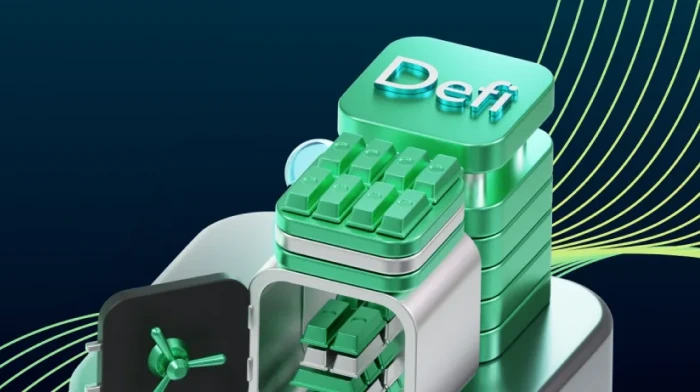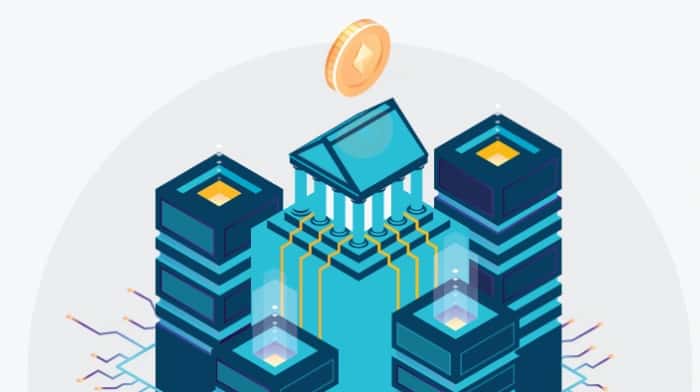
Introduction
The financial industry undergoes transformation through Decentralized Finance (DeFi) which provides cheaper banking alternatives to traditional financial systems. DeFi platforms use blockchain technology to enable peer-to-peer transactions without intermediaries which results in substantial fee reductions.
The decentralized system reduces user expenses while making financial services both efficient and economical. The low-cost DeFi model attracts two main groups of users: individuals who want to escape middleman fees and businesses that need transparent and budget-friendly solutions.
The growth of blockchain technology has made DeFi the preferred system for performing cost-efficient financial operations. This paper investigates blockchain finance operations in DeFi platforms while discussing the rising popularity of DeFi for financial operations.
What is DeFi and How Does It Work?
The financial system known as DeFi operates through decentralized blockchain networks instead of traditional banking institutions. The system establishes an open financial environment which provides accessible and cost-effective services to everyone who has internet access.
The DeFi system removes financial transaction intermediaries to establish direct user-to-user connections. The elimination of middlemen through DeFi results in reduced fees which draws users to decentralized finance systems.
The operation of DeFi platforms depends on smart contracts which are self-executing agreements written directly into blockchain code. The automatic execution of transactions through these contracts happens when specific conditions are met thus eliminating the need for central authorities or middlemen.
The decentralized finance system operates without third parties which leads to lower costs and faster processing and better security and transparency. Users can engage in various financial activities including:
- •Lending and borrowing funds
- •Trading cryptocurrencies
- •Making international transfers
- •Investment opportunities
The traditional financial system demands lengthy and expensive procedures for loan applications and international money transfers. DeFi platforms let users complete these financial operations at both low costs and high efficiency.
DeFi users can borrow funds directly from liquidity pools without needing to go through traditional banking approval procedures and avoid high interest rates and strict collateral requirements.
DeFi operates with an inclusive model which allows anyone to develop or join decentralized finance platforms thus providing equal access to financial services. The combination of reduced costs with expanded access makes DeFi an attractive solution for those who want to lower their transaction expenses while gaining more financial adaptability.
How Blockchain Lowers Transaction Costs in DeFi
Blockchain technology enables DeFi to achieve substantial transaction cost reductions through its fundamental design. Blockchain finance operates through a distributed ledger system which tracks all transaction data across a network of decentralized nodes thus eliminating the need for banks or payment processors as trusted third parties.
Traditional financial systems require multiple entities to process transactions and validate them before settling them. The service charges and transfer costs of multiple intermediaries including banks and clearinghouses and brokers create complexity which drives up fees.
The distributed ledger system of blockchain finance takes over transaction responsibilities which leads to complete elimination of intermediaries and produces substantial cost reductions.
The automation of agreement execution through Smart contracts functions as a key factor in cost reduction. The programming code within these self-executing contracts contains built-in terms which trigger automatic execution when specified conditions become true without human or third-party involvement.
The automated system decreases administrative expenses while removing costly intermediaries which results in reduced blockchain transaction costs.
Blockchain networks depend on decentralized consensus mechanisms which include:
- •Proof of Stake (PoS) - Energy-efficient with lower operational costs
- •Proof of Work (PoW) - More energy-intensive but still decentralized
These mechanisms enable transaction verification without central authorities. The new consensus method PoS aims to reduce operational expenses while the older PoW consensus requires more energy consumption and higher fees yet maintains decentralization.
The blockchain system allows users to conduct financial transactions across borders at a lower cost than traditional international payment systems. The speed and cost-effectiveness of blockchain transactions benefit users who send remittances because they avoid the high fees that traditional international money transfers impose.
The implementation of blockchain finance reduces transaction costs through the elimination of intermediaries and automated smart contracts and decentralized consensus mechanisms which establish an efficient and cost-effective financial system.
Comparing Traditional Finance Costs vs. DeFi
The fees in DeFi are much lower than traditional finance systems because of blockchain technology. Traditional financial systems require multiple intermediaries to process and verify transactions which increases the costs for end users.
The services of brokers, clearinghouses and banks come with fees that they charge to their clients.
Traditional finance transactions incur fees at multiple stages of interaction.
- •International wire transfer fees
- •Currency exchange rates
- •Hidden service charges
- •Credit card processing fees
- •Loan approval costs
The fees imposed on users by the system become a significant problem for both individuals and businesses that need to perform multiple transactions.
Blockchain transaction technology enables DeFi to offer low-cost solutions. Decentralized finance operates on blockchain technology to execute transactions without any need for intermediaries. Smart contracts enable automatic transaction execution based on predefined conditions thus eliminating the need for manual oversight and third-party verification.
The automation process decreases both processing time and administrative fees which results in low costs that attract DeFi users. DeFi platforms implement transparent pricing through fixed or minimal fees which allow users to understand their payment details.
The blockchain network consensus mechanisms eliminate various operational expenses which traditional financial institutions need to pay. Decentralized finance operates through blockchain technology and eliminates middlemen to deliver fast and economical financial services that make them available to both individuals and businesses.
The Role of Smart Contracts in Reducing Costs
Smart contracts form the fundamental structure of decentralized finance by executing financial operations automatically while removing the necessity of middlemen. These self-executing programs, coded directly onto blockchain platforms, automatically execute when specific terms and conditions are met, without requiring human oversight.
Smart contracts enable DeFi savings because they minimize all expenses related to administration and operations.
The security of transactions and legal compliance in traditional finance requires multiple intermediaries including lawyers, brokers and banks. Each intermediary adds fees, making transactions progressively more expensive.
Smart contracts remove third parties because blockchain technology performs verification and enforcement of transaction terms which decreases intermediary dependency and blockchain transaction expenses.
Smart contracts perform automatic transactions when predetermined conditions are satisfied thus removing delays and their associated expenses. Smart contracts enable immediate transaction completion through real-time processing which results in better resource efficiency compared to traditional contracts that use manual processes with associated fees and time-consuming settlements.
Smart contracts in DeFi systems provide users with transparency as a major benefit. The blockchain stores all terms immutably after deployment so users can see every detail of their agreement. The transparent nature of smart contracts stops disputes from occurring which would otherwise require expensive interventions.
Key benefits of smart contracts include:
- •Process automation
- •Intermediary elimination
- •Reduced blockchain transaction costs
- •Enhanced transparency
- •Dispute prevention
Smart contracts in DeFi provide cost savings through automated processes and the elimination of intermediaries and lower blockchain transaction fees. The main elements that drive financial barrier reduction in decentralized finance are their operational efficiency and transparent nature.
Case Study: DeFi Platforms and Their Cost-Saving Benefits
Financial platforms run on decentralized systems have advanced in recent times to enable users to complete transactions at significantly reduced costs while retaining complete control over their financial activities. DeFi platforms use blockchain technology to remove middlemen which results in cost savings for both personal and corporate users while enabling various financial solutions.
Uniswap: Decentralized Trading With Automated Market Makers At Low Cost
Uniswap demonstrates DeFi savings as a decentralized exchange (DEX) which performs cryptocurrency trading through automated market maker mechanisms that do not require centralized intermediaries. The platform depends on Automated Market Makers (AMM) which let users provide trading pool liquidity while prices are determined automatically through algorithms instead of traditional order books.
Users benefit from this model because it removes the need for brokers and exchange operators to charge expensive transaction fees for executing trades. Uniswap functions on Ethereum blockchain infrastructure which enables the cost-effective nature of decentralized financial transactions.
Users bypass third-party custody by trading directly from their wallets which prevents additional fees and delays. The platform rewards liquidity providers which leads to reduced trading expenses for users. The combination of low costs and user asset management capabilities make Uniswap an efficient platform that benefits traders who want cost savings.
Aave: How Decentralized Lending Can Lower Borrowing Costs?
Through its DeFi platform Aave delivers substantial cost reductions in lending and borrowing operations. Traditional banking systems force customers to obtain loans through banks which charge high interest rates and include multiple fees while requiring strict collateral conditions. Aave's decentralized lending platform enables users to obtain loans from liquidity pools where interest rates are computed through supply and demand algorithms.
Through this system the cost of borrowing decreases and operational costs decrease when compared to traditional lending institutions. Aave features flash loans as its uncollateralized loan option which users need to repay within one transaction. The financial products work best for arbitrage activities and debt consolidation needs and provide more cost-effective alternatives than traditional banking options.
Compound: Maximize Returns with Yield Farming on a Cost-Efficient Basis
The lending and borrowing platform operated by Compound offers decentralized finance cost benefits like Aave yet includes yield farming features. Users who supply liquidity to the platform can earn interest from their assets.
Compound offers better interest rates for users than standard savings accounts because it uses algorithms to determine interest rates. The decentralized nature of Compound enables the reduction of traditional banking financial product management costs.
Smart contracts combined with blockchain technology at Compound allow the platform to automatically connect borrowers with lenders without any middlemen which results in cost reduction and user benefit.
The investigated cases show that DeFi platforms deliver substantial cost reductions in comparison to traditional financial systems. Low-cost DeFi is achieved by:
- •Eliminating intermediaries
- •Reducing overhead costs
- •Using smart contracts for accessibility
- •Providing diverse financial products
The financial solutions offered by DeFi savings enable individuals and businesses to access cost-effective and efficient financial alternatives through trading costs and borrowing and yield farming. The growing decentralized finance ecosystem will push forward innovative methods to minimize financial transaction expenses.
Ready to Experience DeFi Cost Savings?
Traditional banking costs can be reduced by up to 90% through decentralized finance according to current data. DeFi platforms are available for exploration today so you can use blockchain technology to control your financial future.
Conclusion
The cross-chain solutions are crucial to ensuring the security of blockchain networks through the sealing of the security loopholes of single systems. They enable transfer of assets in a safe way, enable transparency and risk spread in a multichannel, which makes it much harder to carry out a coordinated attack.
Users enjoy the advantages of secure token flows, increased access to DeFi and added confidence in the digital transactions. In the case of businesses, they develop dependable interoperability infrastructure and ensure the safety of the data exchange in multiple networks.
Cross-chain technologies create a safer and more efficient digital ecosystem by integrating consensus mechanisms, cryptographic safeguards and interoperability protocols. They will soon be a foundation of the future of blockchain as they become more accepted; security, scalability, collaboration all come together to create the next generation of decentralised systems.


